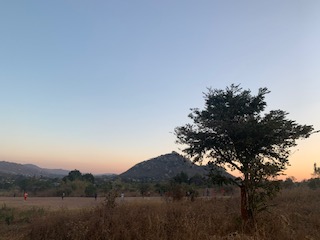“Mambo, Caspert!” my friend Lyric and I say as we climb into the back of his bajaji outside of our campus’s gate. A bajaji is a three-wheeled, quick and easy form of transportation in Tanzania with an appearance quite similar to the cars I used to race back in the Mario Kart days. Caspert picks us up every Tuesday and Thursday at 4:30 to take us to our internship at a local Christian orphanage, located about twenty five minutes outside of Iringa via bajaji.
Lyric and I can both tend to be on the more introverted side, so we sit quietly on these rides- I savor every minute of stillness. I look out the open sides of the bajaji as we weave in and out of the motorcycles and buses of Tanzanian “rush hour,” until soon we’ve reached the outskirts of town and the paved roads turn into bumpy dirt paths woven through villages. Kids have just gotten out of school, and they walk and skip together along the sides of the paths on their way home, their faces lighting up followed by an eager wave when they see us “mzungus” (white people) riding by. Sometimes I look out and see kids still in their school uniforms hunched over working in the fields- Tanzanians really value being strong, hard workers, even at a young age. My eyes gaze upon the lush green fields, contrasted by the rock-covered mountains that surround us on every side. I can’t believe I live here. I can’t believe I get 50 minutes, twice a week, to just take it all in; to be driven through daily life in Tanzania, to be a “fly in a bajaji” and observe and reflect on it all. Bajaji rides are definitely my new love language.
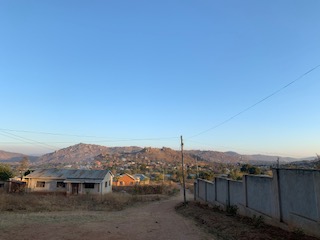
Caspert drops us off at the gate of the orphanage, and as soon as we walk in the little compound of bright green buildings and play equipment, we are greeted by about 30 sets of curious eyes and shy smiles as kids aged 4-18 make their way over to us. Wait, what? Where are the dingy rooms with rows and rows of cribs filled with crying babies? Where are the tired eyed workers rocking and feeding them? Within seconds, I realize that Hollywood has deceived me- this orphanage isn’t a sad, lonely place at all. In fact, I hear laughter coming from every corner. The kids offer Lyric and I an eager “Shikamoo!” which is how those who are younger respectfully greet their elders. It’s hard for me not to laugh when they say this to me- I feel like I should be the one “shikamoo”-ing them for letting us intrude in on the obvious and tight-knit family that has been formed among them.
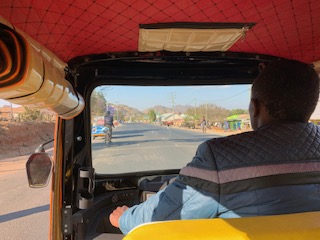
We begin by gathering everyone in a circle, and I yell, “THIS is a repeat after me song!” and we fumble along through “Fishy Fishy,” “Turkeys,” and “King Jesus.” If you were to listen, you’d honestly hear more laughter than actual words repeating after me because many of the kids are still learning English, yet find it hilarious to just make the same sounds I’m making. Then the roles suddenly switch as a few of them gather in the middle of the circle so they can teach us repeat after me songs in Swahili! I love that it’s a dual-learning environment- they teach us just as much as we teach them, but I secretly think I’m learning more because they are teaching me so many life lessons along with Swahili.
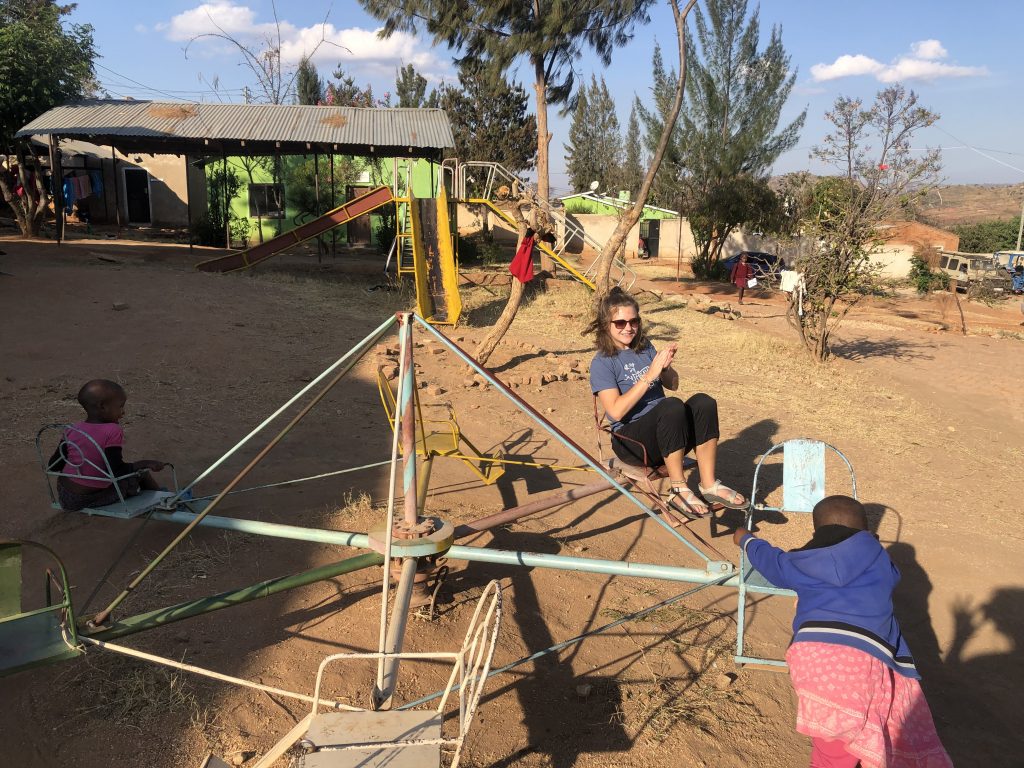
Next, we gather in a classroom and I pull out my Bible. One of the older girls translates for me as I read them the creation story, and Lyric does her best to act it out with grand gestures. Although they can’t understand much of what I’m saying, they are still sitting so attentive and quiet, eager to be exposed to English and to learn more about God. They clap for me when I’m done, and again, I try so hard not to laugh in embarrassment; I wish I could communicate to them to clap for God, instead, for making all of this possible.
Our last activity is illustrating the story we just read, so we hand them paper and crayons and give them free reign to use their beautiful, creative minds to illustrate God’s creation of the earth! Lyric and I color with them, and then walk around the room offering many “nzuri sana!”’s. Very good, we say. And God said it was Very Good.Your drawings are Very Good and you are Very Good, God said so when he created you. They work together and encourage one another, sharing ideas and crayons. Sometimes their drawings turn into some funny-looking portraits of Lyric and I, and when this happens, we no longer contain our laughter but instead let it roar. Laughter knows no language, I think it’s the universal sound of joy. And God said it was Very Good.
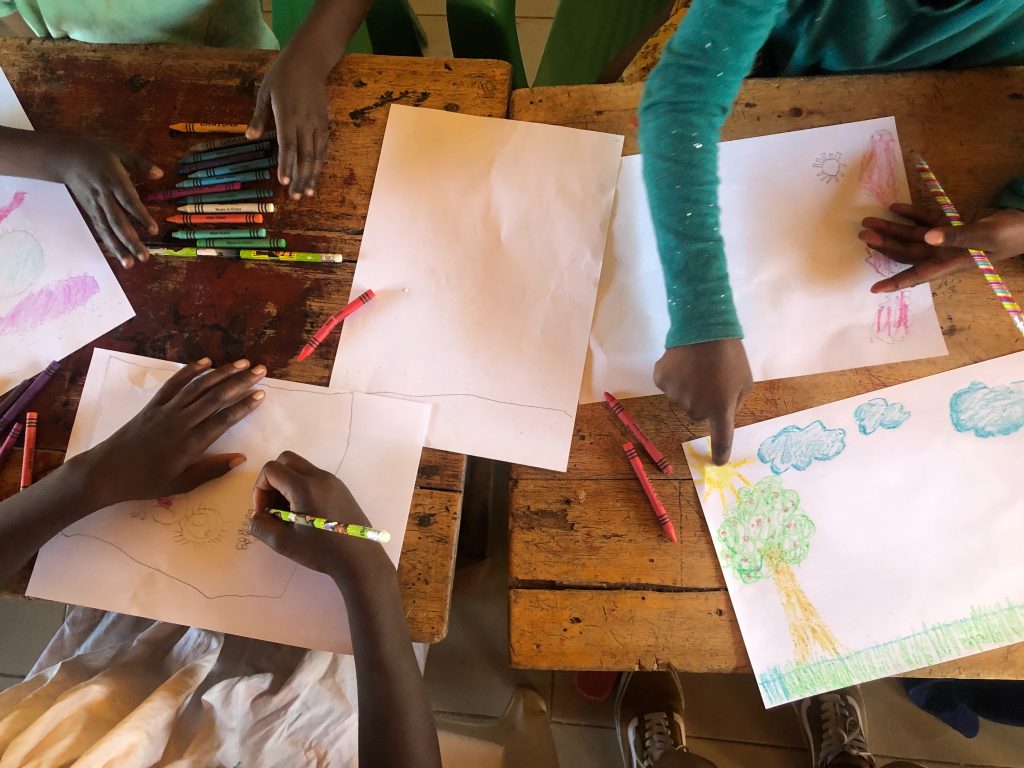
When it’s time for us to leave, we say, “Badaaye, rafikis!” See you later, friends! and receive hugs from many of the younger ones. Caspert’s waiting for us outside the gate; we hop in the bajaji and now we’re making our way down the dirt paths again, back to RUCU. As I stare out at the mountains and fields yet again, I think of my new rafikis. Many of them are orphans due to their parents either being unable to care for them or passing away from the HIV/AIDS pandemic, or a plethora of other heartbreaking reasons. If I were to actually hear their stories, I know my heart would ache. What they offer me instead is their smiles, their laughter, and a beautiful portrayal of a new, loving 30-member family knit together from multiple torn apart families. These 30 energetic and eager kids offer me a picture of brokenness being made into something beautiful right before my very eyes; of God using ashes and dust to create life. I hang on tight as our bajaji zooms down the dirt paths, and the dust flies all around and the sun begins to set- it sinks in. God said it was very good.
